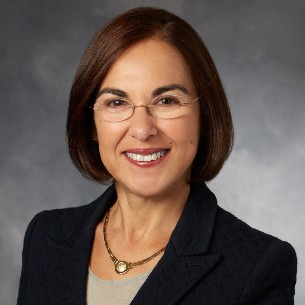 By Lidia Schapira, MD, FASCO
By Lidia Schapira, MD, FASCO
The ASCO Annual Meeting serves as a touchstone for the global oncology community every year. This year, maintaining community has been at the front and center of the response to the COVID-19 pandemic as we in the cancer community have rallied and found new ways to come together. Because an in-person gathering of 40,000 people is not possible this year, the meeting will be held virtually instead. The ASCO20 Virtual Scientific Program will be held on May 29-31, and the educational program and inspiring lectures from ASCO honorees will be offered on August 8-10.
Under our current circumstances, all of us within the cancer community are learning to switch our attention to staying connected through our smartphones, laptops, tablets, and other devices. We have become familiar with apps that allow for video chats, including FaceTime, Facebook Messenger, Google Hangouts, Zoom, WebEx, and Skype. These technologies have also allowed us to incorporate telemedicine into routine medical care as the Centers of Medicare & Medicaid Services have loosened regulations for reimbursement in response to the COVID-19 pandemic. Telemedicine, or telehealth, is a way to connect doctors with patients using a variety of communication technologies. Telehealth services may now be delivered to those enrolled in Medicare by phone so long as video capability is available. I hope these rules outlive the pandemic, as they help give more access to care for those living in remote areas and give us the opportunity to see patients in their homes, where they are more relaxed and feel less rushed.
For the oncology community in particular, May has been the lead-up to ASCO20 Virtual. ASCO is maintaining the tradition of releasing abstracts online (which started May 13) and giving press briefings about exciting discoveries. Patient advocates may register in advance for the ASCO20 Virtual Scientific Program free of charge, regardless of whether they are a member of ASCO, by contacting patientadvocates@asco.org. There is no deadline for registration, and it will be kept open until the end of the Virtual Education Program on August 10.
Patient advocates will also have the opportunity to participate in several online learning opportunities during the meeting, including a virtual program hosted by Guiding Researchers and Advocates to Scientific Partnerships (GRASP) that will enable them to talk with researchers about the science presented at ASCO20 Virtual. In another effort to stay connected, patient advocates who are registered for the meeting will be able to use ASCO20’s networking platform to connect with other advocates and oncology professionals from around the world. Additionally, advocacy organizations are participating in the Virtual Exhibits. Many more patients and advocates will receive our Inside Cancer.Net e-newsletter, which will link to our news summaries and blog posts describing the research highlights.
I have asked many colleagues how they are preparing and planning for ASCO20 Virtual. From some, I hear nostalgia for times spent visiting the art museums of Chicago and having dinner with friends from far away. Others have provided practical tips I want to share with you. Since the majority of the content from the meeting will be available on-demand, which means attendees don’t have to choose which session to attend, the challenge now becomes finding a way to interact and engage with presenters and other experts in a way we have never done before. The answer seems to be to engage in social media, especially on Twitter and Instagram. Twitter appears to be the go-to platform for engaging in discussions in oncology.
There are some regulars in the cancer community who provide a great running commentary on sessions, and they will be out in force this year. If you are new to social media, ASCO has some great resources for those who want to get started. Try following ASCO and other trusted organizations, such as the National Cancer Institute, and follow others in the cancer community on social media, too. Then, look to see who those accounts follow, and perhaps follow some of those accounts as well. Take it in passively at first, just to get a sense of how conversations happen. Then, when you feel comfortable, retweet a post you find impactful or interesting, or reply to someone else's tweet. Finally, share something of interest to you. Be sure to follow and use the meeting hashtag, #ASCO20, as a primary way of staying in touch with what information is being shared about and during the meeting. You can also visit the Cancer.Net Blog for more reports about the meeting and follow Cancer.Net on Facebook and Twitter.
Social media will allow everyone in the cancer community, including patients, patient advocates, survivors, caregivers, and oncologists, to stay connected and follow a real-time commentary on presentations about the latest research. Hopefully, this way of staying connected will remain long after ASCO20 Virtual has passed. Personally, I plan to view live sessions from the meeting in real time and access recorded sessions that are relevant to my clinical practice and research interests during the ASCO weekend. Then, I will invite a colleague to “watch” with me over a video chat and will start looking forward to the next ASCO meeting.
Dr. Schapira is an associate professor of medicine at Stanford University School of Medicine and director of cancer survivorship at the Stanford Comprehensive Cancer Institute. She serves as the editor in chief of Cancer.Net, ASCO's patient information website. Follow her on Twitter @l_schapira.
Originally published on Cancer.Net on May 26, 2020; adapted and republished with permission.


Recent posts